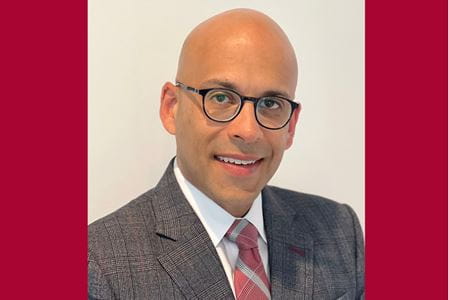INDIANAPOLIS—A graduate of Indiana University School of Medicine is returning to the institution that trained him, to lead one of the school’s largest departments.
Karl Bilimoria, MD, MS, FACS, has been named the new chair of the Department of Surgery. A highly respected physician-scientist in the field of surgical oncology and author of more than 400 publications with nearly $40 million in research funding, Bilimoria graduated from IU School of Medicine in 2003. He is currently a surgical oncologist at Northwestern Medicine in Chicago, also serving as a professor of surgery and vice chair for quality in the Department of Surgery at the Northwestern University Feinberg School of Medicine.
A native Hoosier, Bilimoria’s clinical practice is focused on melanoma and sarcoma, with a research focus on health services, quality improvement, health policy, and medical education. He founded the Surgical Outcomes and Quality Improvement Center (SOQIC), a renowned center of 65 faculty, fellows and staff focused on national, regional and local quality improvement research and implementation. He is also the founding director of the 56-hospital Illinois Surgical Quality Improvement Collaborative and the 215-hospital national surgical education trials group.
“Dr. Bilimoria’s leadership in training future surgeons and improving surgical quality will help advance the department to the next level of excellence,” said IU School of Medicine Dean Jay L. Hess, MD, PhD, MHSA. “His success as a physician-scientist is a proud testament to the training he received at IU School of Medicine, and I am eager for him to continue that tradition of excellence as our new chair for surgery.”
An active leader in national organizations, Bilimoria is past president of the Association for Academic Surgery and the Surgical Outcomes Club, and is a faculty scholar at the American College of Surgeons. Throughout his career, mentoring early career faculty, surgical residents and medical students has been a passion for Bilimoria. He has served as primary mentor for 40 faculty and surgical residents—considering his “Mentor of the Year” award by Northwestern University Feinberg School of Medicine in 2020 to be the most valued accolade in his distinguished career.
“I am thrilled to return to IU School of Medicine, the place that sparked my love for surgery and academic medicine. My vision is for the Department of Surgery to be a premier surgical department in the country, where every division is recognized nationally for its clinical care and quality, research prominence and innovation, and educational excellence in the development of the next generation of surgeons and surgical leaders,” said Bilimoria.
“My experiences at IU School of Medicine were essential in making me the surgeon, scientist and leader than I am today. I am excited to tackle the challenges of serving this large, complex department, and the opportunity to return to my medical school and home state makes the opportunity much more meaningful to me and my family.”
Among Bilimoria’s early mentors was Jay L. Grosfeld, MD, who served as chair of the Department of Surgery from 1985-2003. Fittingly, Bilimoria will hold the title of Jay L. Grosfeld Professor and Chair of the Department of Surgery when he officially starts in his new role August 1, 2022. He will also serve as Vice President of Surgical Quality for IU Health.
Bilimoria earned his undergraduate degree in molecular and cell biology from Northwestern University. He received his medical degree at IU School of Medicine and completed his residency at Northwestern University Feinberg School of Medicine, where he served as chief resident and also earned a master’s degree in clinical investigation. Additionally, he completed a surgical oncology fellowship at MD Anderson Cancer Center, after which he joined the faculty at Northwestern in 2011.
###
IU School of Medicine is the largest medical school in the U.S. and is annually ranked among the top medical schools in the nation by U.S. News & World Report. The school offers high-quality medical education, access to leading medical research and rich campus life in nine Indiana cities, including rural and urban locations consistently recognized for livability.




